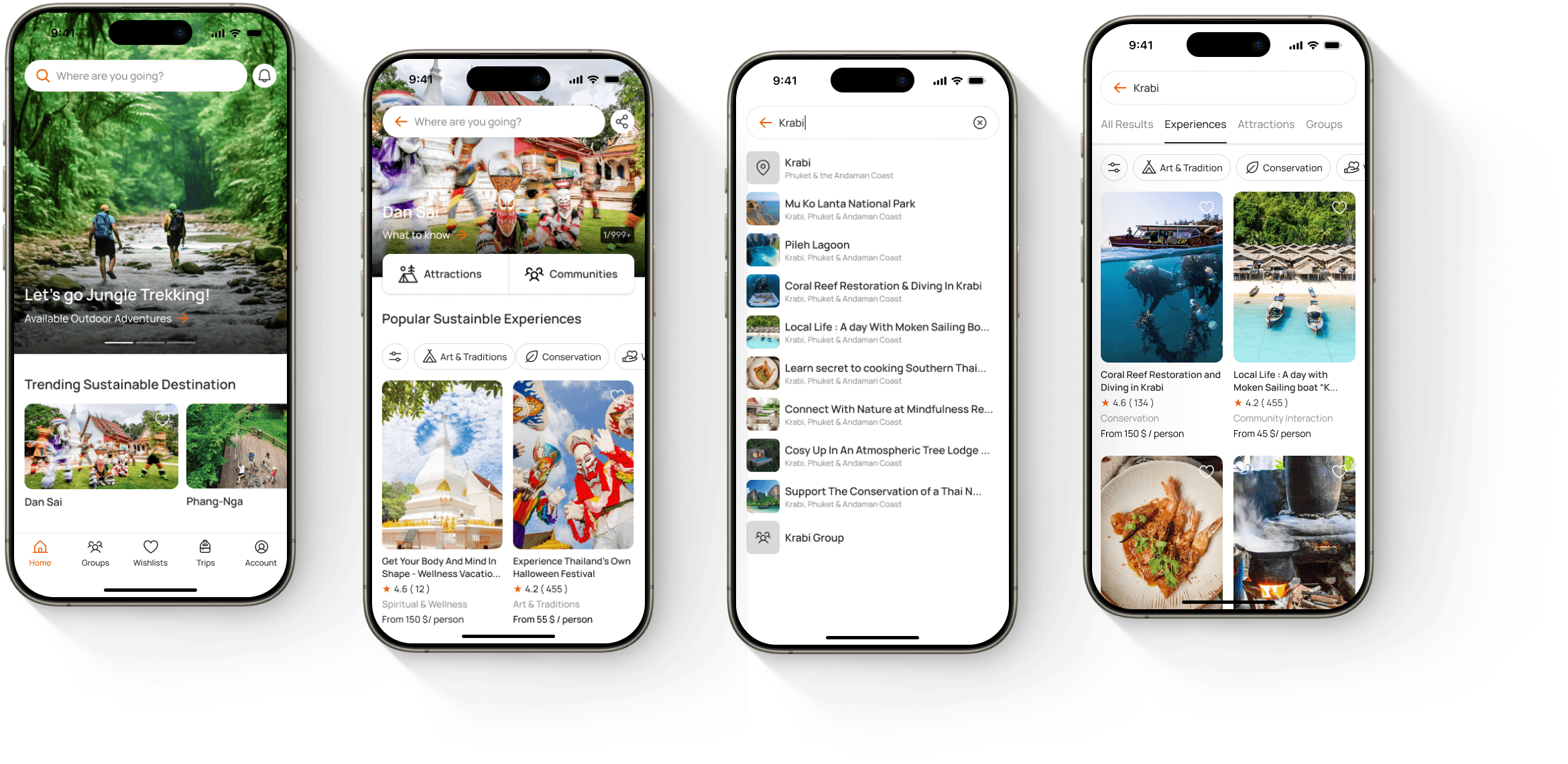- My Team
- Senior Product Designer
- Group Product Manager
- Engineering Team
- Role & Responsibilities
- Built iOS & Android apps from concept to delivery
- New Design System from scratch
- Project Timeline
- 2023 - 2024
discovery
Understanding How, What & When People Search
I spoke to our targeted users, ran a contextual research and user-testing on some of the most popular travel platforms and our competitors's app to find out how our users search sustainable travel destinations and experience. The discovery process helped me to construct the flow and the user journey and identified different search stages.

ZERO QUERY
Location-Based Consideration in zero query search
Based on research, users look for activities and attractions based on their current location or a destination they plan to visit. "Nearby" query encourages user to turn on the location to give them personalized experience and recommendation.
This guided our decision to have "Nearby" suggestion at the top of our zero query content.
deciding on number of suggestions & recent keywords
We keep the list of suggested keywords around 5-10 suggestions to avoid overwhelming users with too many options. The exact number of recent keywords are also adjusted based on the available real estate of the mobile device.

Predictive Search (perosnalized suggestions to easily discover sustainability options)
To prevent information overload and to carter to individual need, real-time suggestions are designed by analyzing a user's past searches, browsing history, current location, and recent searches.
The prioritization within the suggestion list follows a strategic order, placing city pages (trending cities) at the forefront as destination pages are where users can discover eco-friendly attractions and sustainable experiences.
SEARCH RESULTS
Comprehensive yet relevant search results
Users often face the challenge of sifting through vast amounts of travel information to find what they need in a platform like ours. So, I design the search result page with a clear information architecture to provide the most relevant and accurate information based on the queries. For example, users can easily switch across different categories of the results.
To balance user need with the business objectives, I prioritize search results not just based on relevance, but also business priorities. Experience section is elevated above the fold to easily generate conversion rate, translating into bookings and revenue for the app.
FILTERS
Building User-centered Information Architecture
Our users want to quickly narrow down their choices to save time and effort in the decision-making process. Since user preference are subjective and sustainable travel trends are continuously evolving, we had a difficult task of solving the complexity of categorizing experiences.
I conducted extensive user research on different type of sustainable travel and designed the information architecture. I also develop a hierarchical taxonomy that organizes activities and attractions into meaningful categories and subcategories. We finalized themes, interests, or activity types that resonate with our users through users' feedback and the results from card-sorting.
Step 1 - Brainstorm
We utilized a lotus diagram to organize a diverse array of ideas encompassing various categories of sustainable travel. Recognizing the expansive scope of sustainable travel, we ensured that no pertinent activities were overlooked or excluded from consideration.

Step 2 - Validate
The main travel themes and sub-categories, achieved by card-sorting are validated both by suppliers who provide experiences on the platform and feedback from the travellers.


Step 3 - The results
We've established 5 core themes for sustainable travel along with 16 categories encompassing various sustainable activities. All travel experiences provided by tour operators have been organized into these categories, allowing travellers to easily filter based on personal preferences. This approach stems from our commitment to user-centered information architecture, ensuring that our platform is intuitive and tailored to the needs of our users.
Future scope
Tagging & Attributes Taxonomy Implementation at a later stage
We brainstormed the implementing of a tagging system and attributes to assist users filter activities by very specific interest, traveller type, difficulty and skill level. Given the limited availability of tour experiences with established sustainability credentials, we have decided to postpone the implementation of this feature for future consideration.
REFLECTION
What is next
This was a really exciting and fun project for me to work on as it provides real value, involved a ton of research on sustainable travel, and detailed on search algorithm. I learned some important takeaways from this project related to teamwork, constraints and data privacy. As of January 2024, the search module is in development after the successful usability testing.










